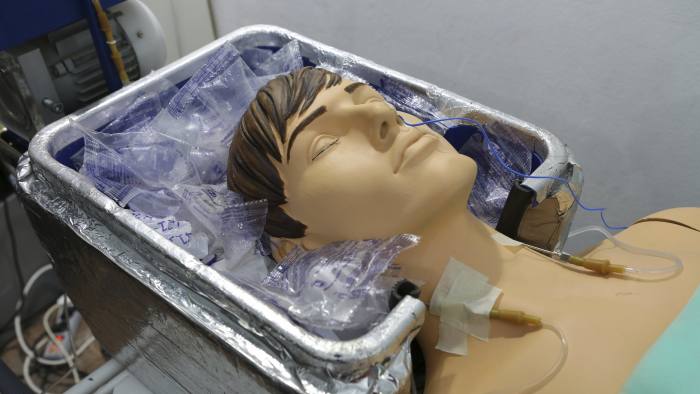In 1999, the futurist Ray Kurzweil published a book entitled The Age of Spiritual Machines. He looked forward to a future in which the “human species, along with the computational technology it created, will be able to solve age-old problems?.?.?.?and will be in a position to change the nature of mortality.”
1999年,未来学家雷?库兹韦尔(Ray Kurzweil)撰写的一本叫做《机器之心》(The Age of Spiritual Machines)的书出版了。在他所期待的未来,“人类及其创造的计算技术将能够解决古老的问题……并将能够改变死亡的本质。”
Mr Kurzweil is now an executive at Google, one of whose co-founders, Larry Page, launched a start-up, Calico, in 2013 with the aim of harnessing advanced technologies that will enable people to “lead longer and healthier lives”.
库兹韦尔现在是谷歌(Google)的一名高管。2013年,谷歌创始人之一拉里?佩奇(Larry page)创办了一家初创企业Calico,其宗旨是利用先进技术,让人们能够“更长寿、更健康”。
Others go even further. Aubrey de Grey, co-founder of Strategies for Engineered Negligible Senescence, a research centre, believes that ageing is just an engineering problem. Technological progress, he maintains, will eventually enable human beings to achieve what he calls “life extension escape velocity”.
有一些人的目标更为远大。研究机构Strategies for Engineered Negligible Senescence的联合创始人奥布里?德格雷(Aubrey de Grey)认为,衰老只是一个工程问题。他认为,科技进步最终将让人类得以达到他所说的“寿命延长的逃逸速度”。
As for Mr Kurzweil, earlier this year he announced that he had “set the date 2045 for the ‘Singularity’ which is when we will multiply our effective intelligence a billion-fold by merging with the intelligence we have created”. In this “transhumanist” vision, once we turn ourselves into “spiritual machines”, we will be able to live forever.
至于库兹韦尔,今年早些时候,他宣布他“把2045年确定为达到‘奇点’的时间,到那时我们将通过与我们创造的智能相结合,让我们的实际智慧增强10亿倍”。在这种“超人类主义”的远景中,一旦我们变成了“有灵魂的机器”(spiritual machines),我们就能永远活下去。
Although mortality denial is currently fashionable in Silicon Valley, it is not new. On the contrary, it is one of the most successful products ever designed and has been on the market for millennia.
尽管在硅谷,“否认死亡”(mortality denial)现在是个时髦词汇,但它并不新鲜。相反,它是有史以来设计过的最成功的产品之一,已经出现在市场几千年了。
Because human beings are the only animals to have evolved an explicit, consciously experienced insight into their own finitude, there is a robust and enduring demand for this particular psychological sleight of hand. Unfortunately, death is not just something the Chinese have invented to make America less competitive. Empirical evidence and rational argument converge on the simple, sobering fact that all of us will eventually disappear for good — sooner or later, more or less gracefully, and with more or less suffering.
因为人类是唯一一种已经对自身局限性形成了明确的、自觉的认识的动物,所以人类对这种特殊的心理把戏有着强大且持久的需求。不幸的是,死亡并非只是中国人发明出来让美国降低竞争力的东西。经验证据和理性辩论都指向一个简单、发人深省的事实:我们所有人最终都将永久性消失,或早或晚,或比较潇洒或不那么潇洒,或比较痛苦或不那么受苦。
It is hard to face this fact in an intellectually honest manner. Human beings have a problem that no creature before them had: the human cognitive self-model explicitly tells its user that everybody dies, thereby creating a toxic form of self-knowledge, a deep existential wound. My emotional deep structure tells me there is something that must never happen, while rational thought tells me that the ultimate accident is inevitable. Religion was an early-stage adaptation to this neurocomputational bug.
我们很难坦诚地面对这个事实。人类面对的问题是在人类之前任何生物都没有遇到过的:人类认知的自我模型明确告诉它的使用者,所有人都会死,从而创造了一种有害的自我认知形式,一个深深的关乎生死的伤口。我内心的情感告诉我,有些事情永远不会发生,而理性思维告诉我,最终的意外是不可避免的。宗教是对这种神经计算缺陷的早期适应。
Aiding and abetting human self-deception in ingenious and sophisticated ways is therefore a lucrative business.
因此,用独创且复杂的方式来帮助和煽动人类自我欺骗是一门有利可图的生意。
In its most primitive form, represented by organised religion down the centuries, mortality denial has consisted in just that — simple, outright denial. In the religious perspective, the good news is that all of this is not true — the dead will be resurrected. You are loved and accepted by an omnipresent divine being. And if you manage to accept yourself as accepted, you will finally be able to feel at home in a strange and hostile world, reacquainting yourself with the early childhood emotion of security.
有着最原始的形式,以许多世纪以来的有组织宗教为代表,否认死亡的要点在于简单、彻底的否认。从宗教的角度来说,好消息是一切都不是真的,死去的人将复活。有一位无处不在的神在爱着你并接受你。如果你接受被神所接受的自己,你最终将能够在一个陌生且敌对的世界中应付自如,重新体验儿时那种安全感。
The gospel of alternative facts comes in many different flavours and varieties. In organised self-deception, there are levels of sophistication. For example, a Buddhist may claim that she does not even want to be reborn, that her highest goal is to liberate herself from the cycle of death and rebirth. If things don’t work out with nirvanic giga-bingo in this life, then, unfortunately, something in you is forced to survive death.
这种替代事实的教义多种多样。在有组织的自我欺骗中,复杂程度各有不同。例如,佛教徒可能认为,她甚至不想重生,她的最高目标是让自己摆脱死亡与重生的循环。如果此生未能如愿进入极乐世界,那么不幸的是,你身体中的一些东西将不会死亡。
Other versions of denial involve tying your self-esteem to your tribe or nation. You can stabilise your sense of self-worth by being a good communist, a pious Catholic or by becoming a complacent secular humanist — all you need is a set of values that you can live up to and a mutually reinforcing community of believers.
其他否认死亡的版本包括把你的自尊与你所属的部落或国家联系在一起。你可以通过成为一个优秀的共产主义者、一个虔诚的天主教徒或成为一个洋洋得意的俗世人文主义者获得自我价值感。你需要的是一套你能遵守的价值观以及一个互相促进的信徒群体。
Others strive for symbolic immortality by seeking to make a genuine and lasting contribution to science, philosophy or culture. Imagine writing a book that will be read centuries after your death, or composing a piece of music or creating art that will be admired by thousands long after your physical body has shrivelled and perished.
还有一些人通过寻求为科学、哲学或文化做出真正持久的贡献,努力获得具有象征意义的永生。例如,写一部在你死后几百年仍被阅读的著作,或者创作一首音乐或一件艺术品,在你的躯体灰飞烟灭很久之后仍将被数千人称颂。
Silicon Valley tech evangelism and transhumanism are merely the latest forms of culturally evolved self-deception. They present us with a new metaphysical placebo for existential palliative care. Will we upload ourselves into virtual reality? Perhaps a benevolent superintelligence can help us break through into a life beyond all suffering? Could the church of the technological singularity be right in proclaiming that immortality is nearer than we think?
硅谷的科技传道和超人类主义只是在文化上有所进化的自我欺骗的最新形式。他们为关乎人类存在的姑息疗法带来新的超自然的安慰剂。我们是否会把我们自己带入虚拟现实?或许,一种善意的超级智能可以帮助我们摆脱所有痛苦?技术奇点学说宣称永生比我们想象的更近,这是否正确?

It is tempting to dismiss scientifically inspired presentiments of immortality as arrant nonsense, but we should not underestimate the way ideas like transhumanism speak powerfully to our unconscious need for delusion. This is not only a new religion that does without God and churches — it also is a marketing strategy for new technology. A novel form of cross-promotion and co-branding, tech evangelism really aims at a deeper and more efficient penetration into the digital marketplace by offering mortality denial in the same package.
我们很容易将受到科学启发的永生预感斥为胡说八道,但我们不应低估超人类主义之类的想法有力的证明了我们潜意识中是需要幻觉的。这不仅是一种没有上帝和教堂的新宗教,也是一种推广新科技的营销战略。科技传道是一种新型的交叉推广和品牌联合,真正的目的是通过提出同样包装的否定死亡之说,更深入、更有效地渗透到数字市场。
The writer is a fellow in the Gutenberg Research College at the Johannes Gutenberg University in Mainz
本文作者是德国美因茨约翰内斯古滕贝格大学(Johannes Gutenberg University)古滕贝格研究学院(Gutenberg Research College)研究员












